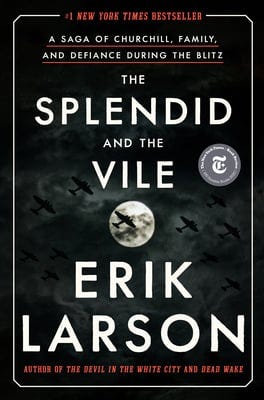No, YOU’RE the only person who had never read anything by Erik Larson until two weeks ago and now question what you think and know about everything!
OK, one of my great humiliations as a reader is that I’d never read any Erik Larson books (and still have never read any Doris Kearns Goodwin. Why? And also, why?) Even though I knew Larson was the subject of endless and well-deserved praise, I often find history non-fiction to be a little trudging with its ceaseless firehose of dates and treaties and endless governing men named Henry and Thomas whom I struggle to keep straight.
But after my boss and parents raved about this. After my sweetie couldn’t put it down. And after reader Kira was the latest in a long line to suggest it, it finally was time (thanks Kira!) And of course I savored every single word of The Splendid and the Vile, like just about every carbon life form on the planet who’s already read it.
Now, if you have not yet read it, hey - no shame! Here’s what you need to know. Briefly, this is a narrative of Churchill in his first year as Prime Minister, during the Blitz, chronicling his leadership during the acute and global crisis of the war.
Even if this doesn’t immediately sound like your cup of tea (all Britishisms intended), let me tell you why this is a book everyone can love.
For readers:
This is a virtual symphony of beautiful words. I’m not just referring to the otherworldly oratory of Churchill that will make you want to be a better speaker and possibly a better human - though that’s a big bonus in this book. It’s even more about Erik Larson’s unparalleled writing. If there’s a writer working right now who makes more felicitous, specific and exquisite word choices, I can’t think of who it is. Every sentence of The Splendid and the Vile has completely unexpected but bafflingly ideal language that paints a vivid picture. It’s worth reading JUST for the words.
For leaders:
OK, fine, HERE’S a business book recommendation for you. (Don’t get used to it.) Every chapter reveals lessons in leadership, in PR and managing optics, of tailoring efforts to a specific audience, of stoking morale and wrangling opponents, of managing by carrot and by stick to produce seemingly impossible feats. While Churchill emerges as an almost divinely anointed man for the moment, there are countless examples from Churchill’s circle including the inimitable Lord Beaverbrook who basically and improbably 10x’d the factories, and even a few examples from the grotesque but effective Nazi propaganda machine.
For romantics:
Where are my Austen lovers at? Because one of the reasons this books is so outrageously readable is that Larson weaves in the intimate details of daily and personal life that’s often missing from historical narratives. It’s the very delicate (and apparently meticulously researched and documented) details of the food, the clothing, the weather and flowers on a given day, the rooms and decor, the gossip, and the monotonous and the sumptuous activities that give the entire narrative heart, and breath, and wicked counterpoint to the devastating details of war.
For armchair psychologists:
This book has a hero, and it’s Winston Churchill - and yet one of the great tricks of the story is how Larson conveys the self-rationalizing mindset of virtually every actor (and the banal, almost unremarkable rationale behind some profoundly consequential or evil behavior.) He judiciously pulls in anecdotes about Goring or Goebbels to explain a pivotal moment, or weaves in Roosevelt’s reluctance to join the war, that with the benefit of hindsight seem mad. Yet Larson mostly refrains from providing explicit moral commentary, instead letting the words speak for themselves. It makes a better book, and it’s yet another illustration how everyone truly feels they are the winners, the good guys, and the actors on the right side of history.
For everyone else:
This is simply a remarkable, almost unbelievable story of courage, belief, and fortitude not just from Churchill - although truly that - but of the young men of the RAF and of the English people. I couldn't put it down. And in a time when I think we can all use a little inspiration, some shoring up, and a reminder of our better angels, it’s kind of incredible that we can find it in a book about the absolute devastation of war. But there you go. Reading. It’s the tonic.
“It would be foolish to disguise the gravity of the hour,” he said. “It would be still more foolish to lose heart and courage.”
For more mystery series I love, read here.
And a few last things to note:
If this book is not your style, fear not, gentle reader! There are 45 weeks of other suggestions here in the archive. Why not check out YA Fiction Adults Will Love, or Celebrity Memoirs That Don’t Suck?
Sure, the Big Retailer can ship you a book, a garden hose, AND a set of steak knives, but does it support independent bookstores and send you a wee charming bookmark? Nope. That’s why all of the links above go to Bookshop.org. You can also find all my past recos here.
If you like this newsletter, go on and share it with the world! Ok thanks.






